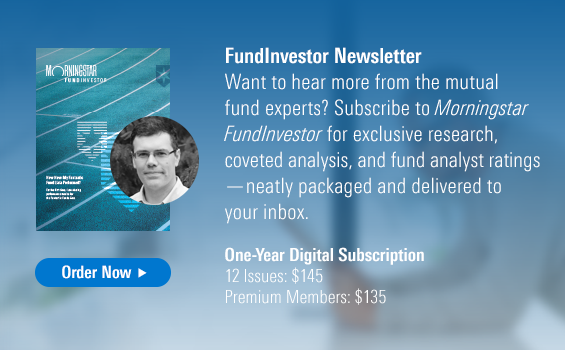The Market Rotation Reveals Light at the End of the Tunnel
Susan Dziubinski: Hi, I'm Susan Dziubinski with Morningstar. Large-cap growth stocks have enjoyed remarkable returns this year. But in November, we saw some sector market rotation where smaller companies and value stocks gained a little bit of ground. Here with me today to go through all the numbers is Russ Kinnel. Russ is Morningstar's director of manager research as well as the editor of Morningstar FundInvestor.
Hi, Russ, nice to see you. Thanks for being here.
Russ Kinnel: Glad to be here.
Dziubinski: Let's talk a little bit first about just how dominant large-cap growth strategies have been. They came into 2020 with a nice tailwind from 2019, and it seems like for a large part of 2020, they spent their time increasing the gap in performance between value and smaller-cap names. Can you talk a little bit about why that was?
Kinnel: You're right. We've been long talking about the FAANGs--Facebook, Amazon, Google kind of names--that have been dominating performance, and that was even before this year. If anything, you'd expect it to reverse. But no, growth just crushed value even more, and to a degree COVID even accelerated that. And the reason is that a lot of the value side is economically sensitive. So, if you think about oil and any kind of energy companies, airlines, a lot of the value side is economically sensitive. Of course, out of the blue, in a sense, COVID came in and crushed the economy. So, very harsh on value. Then, on the other hand, some of the solutions to our new problems of trying to stay at home lived over in the growth land. So, things like Zoom and Amazon and others were profiting tremendously from that. So, we had a growth-dominant market that then became an even much bigger gap between growth and value.
Dziubinski: But the pattern shifted a little bit in November, right Russ, after the election and after we got some good news on the vaccine front?
Kinnel: That's right. The market started to rally on the election news, and then we got the vaccine news a week after the election, and now we've had a second vaccine announced with really great results. And so it's really dramatically led to a reversal in the markets. And the reason is that, again, now we can see light at the end of the tunnel. A lot of economically sensitive names now cay say, "OK, the economy may well spring back very strongly in, let's say, March or April." That's just a guess, but somewhere out there these vaccines imply that the economy will be able to get back to normal. So, airlines and energy and a lot of the other industries are doing great. Just for the month to date through Nov. 17 we have small value up over 17% and large growth is the worst of our style box categories, up a little under 9%, so a really dramatic reversal in fortune.
Dziubinski: And are there any particular funds that you'd like to comment on that did particularly well during this stretch?
Kinnel: If you own a value fund that you've really been hating and has been disastrous, it probably looks good. So, two of the best performers month to date are Causeway Global Value and Causeway International Value, but also funds like Oakmark International and Oakmark Global or Hotchkis & Wiley Mid-Cap Value. These are funds that are all kind of deep value, and all of them have significant energy and other economic exposure. Those funds that I mentioned, those are all up 20% or better just for the month to date. So, really a dramatic rally from some of the funds that have done worse. And I should also mention that even after that, almost all of those funds are still in red for year to date. So, it's been a great rally but you're still probably not feeling real rich if you own those funds.
Dziubinski: Let's pivot over to the fixed-income side. Let's talk about bonds in November. What did they do during this rally we've seen in value in small caps?
Kinnel: The first bit of news on the vaccine led to the long end of the market selling off a bit because, of course, the long end is very economically sensitive. But then since then, we actually saw that's kind of reversed a bit and now it's the short end that's hurting a little. But really, these are only like very minuscule losses. So, the bond market hasn't been great, but it didn't lose money for the most part. Now, it's mostly flat. It's kind of a reversal, of course, of what we saw, say, in March when bonds rallied sharply on the expectation that the economy would really slow down.
Dziubinski: So, at the end of the day, Russ, if investors are looking at their results for 2020, what is the story? How do things look for them?
Kinnel: Well, even after this huge reversal, growth is still in great shape. The typical large-growth fund is up 28%, typical small-value fund down 4%. So, we've had a great lesson this last month in how quickly that can turn. You can't really predict those sort of things, but it really changed quickly. So, for sure, growth is still very expensive and value by most measures is still pretty cheap, and I do think it does illustrate just how hard it is to predict, especially in the short run. Who would have predicted such a big change in fortune in just a couple of weeks?
Dziubinski: Well, Russ, thank you so much for your time and for helping us put these numbers in perspective. We appreciate it.
Kinnel: You're welcome.
Dziubinski: I'm Susan Dziubinski for Morningstar. Thank you for tuning in.


/s3.amazonaws.com/arc-authors/morningstar/fcc1768d-a037-447d-8b7d-b44a20e0fcf2.jpg)
/s3.amazonaws.com/arc-authors/morningstar/35408bfa-dc38-4ae5-81e8-b11e52d70005.jpg)
/cloudfront-us-east-1.images.arcpublishing.com/morningstar/DOXM5RLEKJHX5B6OIEWSUMX6X4.png)
/cloudfront-us-east-1.images.arcpublishing.com/morningstar/ZKOY2ZAHLJVJJMCLXHIVFME56M.jpg)
/cloudfront-us-east-1.images.arcpublishing.com/morningstar/IGTBIPRO7NEEVJCDNBPNUYEKEY.png)
:quality(80)/s3.amazonaws.com/arc-authors/morningstar/fcc1768d-a037-447d-8b7d-b44a20e0fcf2.jpg)
:quality(80)/s3.amazonaws.com/arc-authors/morningstar/35408bfa-dc38-4ae5-81e8-b11e52d70005.jpg)